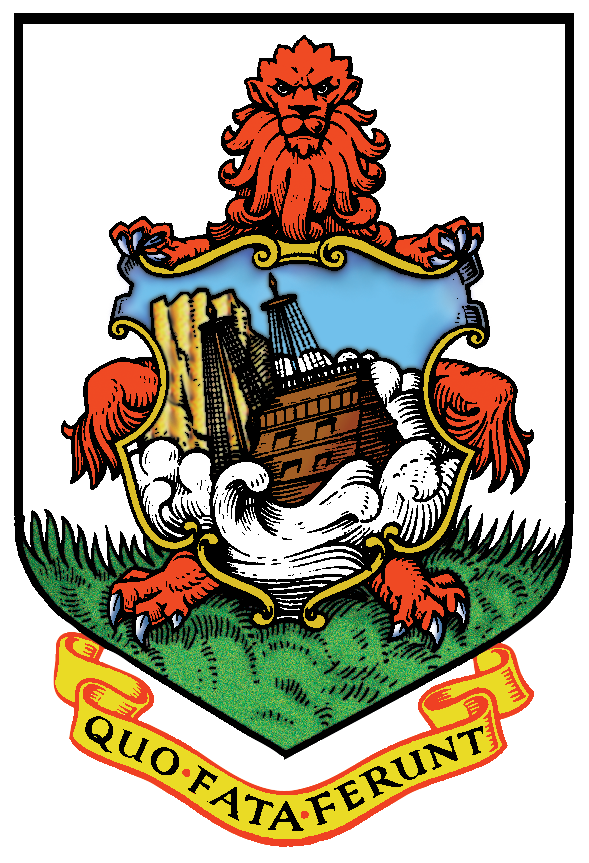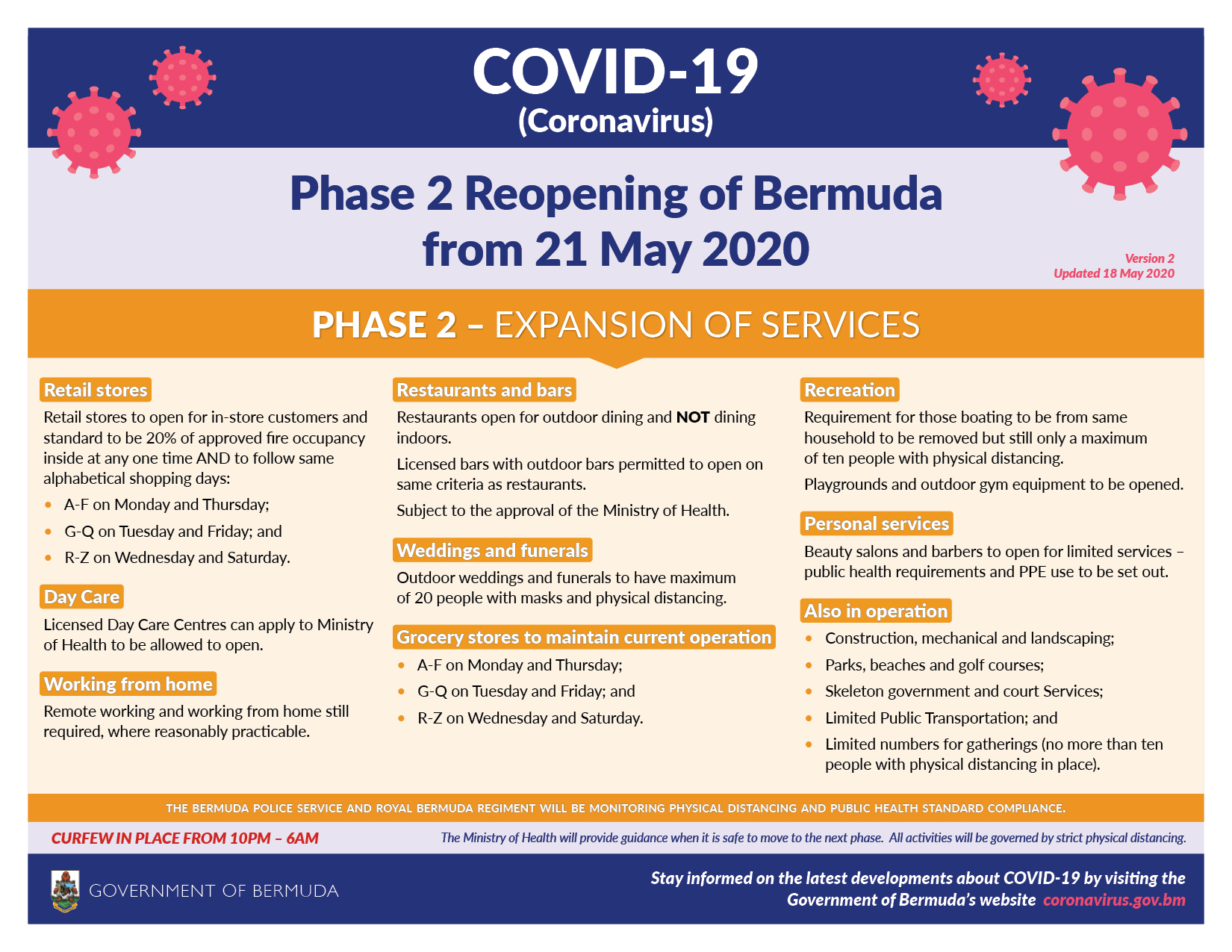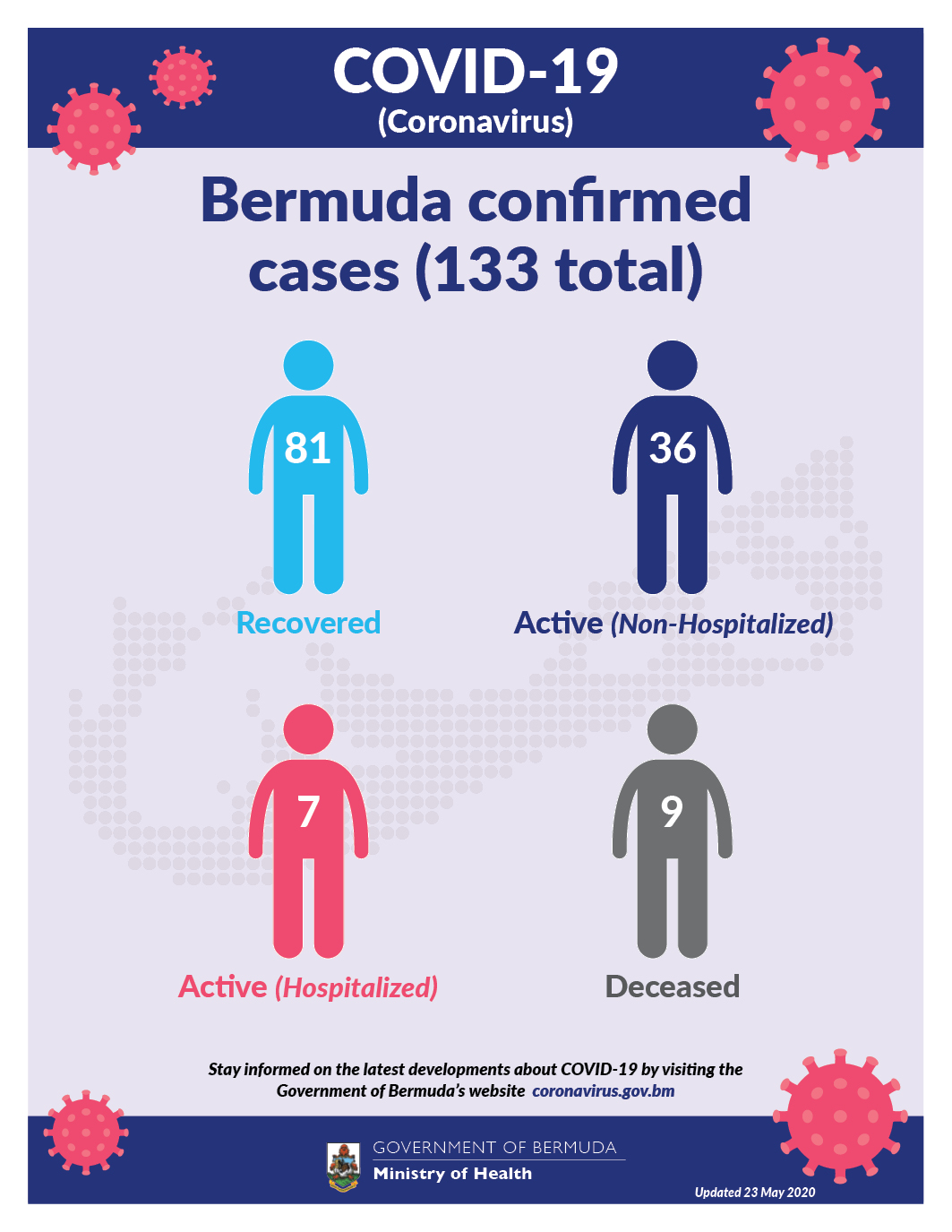Bermuda is closely monitoring the global developments of the Coronavirus (COVID-19) through the World Health Organization (WHO) and with our regional public health partners – Public Health England, Pan-American Health Organization and Caribbean Public Health Agency.
Bermuda is currently in PHASE 2
Phase II Guidance
View all COVID-19 Press Releases
View all COVID-19 Videos
View all COVID-19 Resource Material
The current World Health Organization risk assessment for novel coronavirus (COVID-19) is very high risk globally. It is advised that all countries prepare for the possibility of COVID-19 in their communities. Everyone has a role to play in getting ready and staying healthy by practicing everyday prevention measures like frequent hand washing, staying home when sick and covering coughs and sneezes. The World Health Organization has declared the current coronavirus situation as a pandemic. A pandemic is the increased and sustained transmission of a disease across many countries.
Surveillance for respiratory illness has been enhanced in collaboration with local public health partners. Persons with respiratory illness including fever and cough should call ahead and inform their health care provider of their travel history prior to attending for medical care.
This is a rapidly changing situation. Please regularly check this page for updates.
Data is as of 3:00 pm 23 May 2020
| Port Health Monitoring |
Number |
| Quarantine with public health supervision | 240 |
|
COVID-19 Testing |
Total |
| Total | 6362 |
| Results negative | 6229 |
| Results positive | 133 |
|
Transmission Status of Confirmed Cases |
|
| Imported | 41 |
| Local Transmission [Known contact/source] | 78 |
| Local Transmission [Unknown contact/source] | 10 |
| Under Investigation | 4 |
|
Status of Confirmed Cases |
|
| Recovered | 81 |
| Active (non-hospitalized) | 36 |
| Active (hospitalized) | 7 |
| Deceased | 9 |
Quarantine with public health supervision: All adults entering Bermuda are required to quarantine with public health supervision in a government quarantine facility for 14 days. These individuals will be monitored for symptoms during their time in quarantine. Exemptions allowed to self-quarantine at home for minors and for medical reasons.
Self-quarantine with public health supervision: All persons entering Bermuda from 17 March 2020 are to self-quarantine with public health supervision. Health personnel are in communication with these persons over the course of the self-quarantine period having provided a plan for self-monitoring for symptoms and clear instructions for notifying a health care provider before the person seeks health care if they develop fever, cough, or difficulty breathing.
Imported: Cases acquired outside of Bermuda.
Local transmission: Cases acquired within Bermuda
Under investigation: Type of transmission has not yet been determined. These cases are not imported and are likely the result of local transmission.
Recovered: Person has had no fever for at least 72 hours (3 days) without the use of fever-reducing medication, other symptoms have improved and at least 14 days have passed since onset of symptoms.
Country status: Local transmission.
Information for Travellers
A travel ban is in effect from 20 March 2020.
A travel ban is in place, disallowing travelers to Bermuda unless the person:
belongs to Bermuda,
- is a resident of Bermuda or a dependent who has permission to reside in Bermuda,
- is a crew member of a cargo or commercial aircraft,
- cargo ship, or
- has written permission of the Quarantine Authority of Bermuda to enter.
Anyone entering Bermuda shall comply with the requirements under the Quarantine Act 2017 and the Public Health Act 1949.
All persons entering Bermuda, residents, visitors, and crew, will be required to self-quarantine for 14 days from arrival. Visitors and crew may depart Bermuda based on their travel itinerary if shorter than 14 days if they remain asymptomatic.
COVID-19 Screening Form for travellers arriving in Bermuda
What is COVID-19?
COVID-19 is the infectious disease caused by the most recently discovered coronavirus. Coronaviruses are a large family of viruses which may cause illness in animals or humans. In humans, several coronaviruses are known to cause respiratory infections ranging from the common cold to more severe diseases such as Middle East Respiratory Syndrome (MERS) and Severe Acute Respiratory Syndrome (SARS).
What are the symptoms of COVID-19?
The most common symptoms of COVID-19 are fever, tiredness, and dry cough. Some persons may have aches and pains, nasal congestion, runny nose, sore throat or diarrhea. These symptoms are usually mild and begin gradually. Some people become infected but don’t develop any symptoms and don’t feel unwell.
Most people (about 80%) recover from the disease without needing special treatment. Around one out of every six people who gets COVID-19 becomes seriously ill and develops difficulty breathing. Older people, and those with underlying medical problems like high blood pressure, heart problems or diabetes, are more likely to develop serious illness. People with fever, cough and difficulty breathing should seek medical attention and call in advance.
How does COVID-19 spread?
People can catch COVID-19 from others who have the virus.
The disease can spread from person to person through small droplets from the nose or mouth which are spread when a person with COVID-19 coughs or exhales. These droplets land on objects and surfaces around the person. Other people then catch COVID-19 by touching these objects or surfaces, then touching their eyes, nose or mouth. If you think a surface may be infected, clean it with simple disinfectant to kill the virus and protect yourself and others.
People can also catch COVID-19 if they breathe in droplets from a person with COVID-19 who coughs out or exhales droplets. Try to maintain at least two metres (six feet) distance between yourself and anyone who is coughing or sneezing.
The risk of catching COVID-19 from someone with no symptoms at all is very low. COVID-19 is not spread by mosquitos, water, or food.
Should I worry about COVID-19?
Illness due to COVID-19 infection is generally mild, especially for children and young adults. However, it can cause serious illness: about one in every five people who catch it need hospital care. It is therefore quite normal for you to worry about how the COVID-19 outbreak will affect you and your loved ones.
We can channel our concerns into actions to protect ourselves, our loved ones and our community. First and foremost among these actions is:
- Regular and thorough hand-washing with soap and water. If soap and water aren't immediately available use an alcohol-based hand sanitizer.
- Avoid touching your eyes, mouth, and nose.
- Practice good respiratory hygiene. Cover your cough or sneeze.
- If you are unwell stay at home. Do not go to school, work or attend social gatherings.
Policy guidelines for COVID-19 protective supplies
Upon proper declaration, Customs will make duty relief available to all importers for personal protective equipment and supplies (PPE) under CPC 4235, subject to the following conditions:
- PPE must be used only in connection with disease prevention and control (refer to “Disease prevention and control” below).
- Only PPE certified by the Director of Health (the Director) will qualify for duty relief (refer to “Qualifying goods” below).



